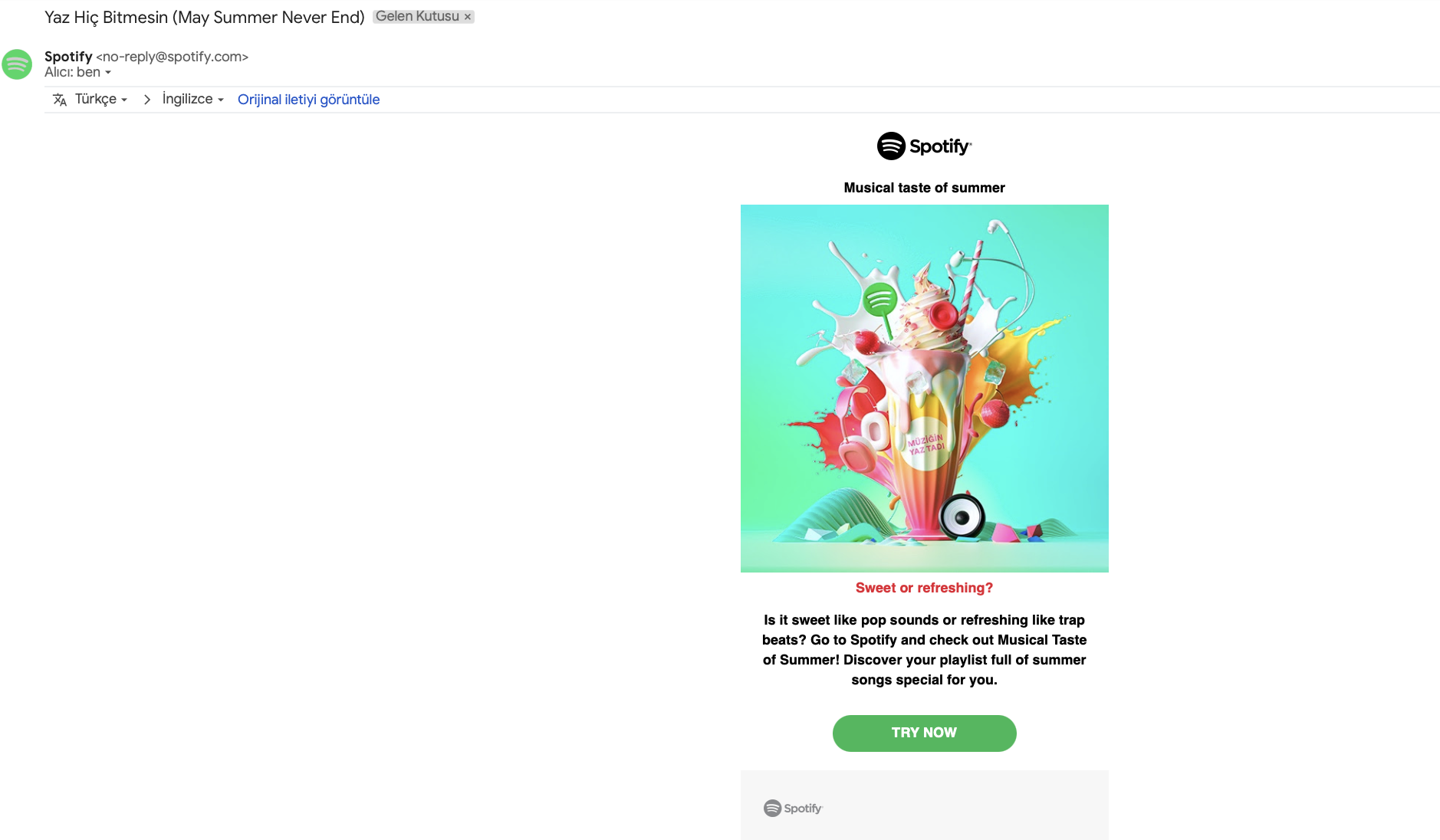AI in E-mail Marketing
Email marketing has long been an integral part of the digital world. A powerful and essential way for businesses to reach and engage with customers, email marketing is gaining a new dimension in terms of efficiency and competitive advantage: artificial intelligence.
The combination of AI and email marketing can improve the customer experience and give businesses the advantage of running a personalized, data-driven email marketing process. In this article, I will share with you the basics of email marketing, how it is integrated with artificial intelligence, and the critical points of this integration for businesses.
Let's examine how to create a more effective email marketing strategy for companies by combining the power of email marketing and artificial intelligence.
Importance and Benefits of Email Marketing
Email marketing offers many opportunities such as reaching a wide audience, personalization, and increasing cost, and conversion rates. For this reason, email marketing is an integral part of digital marketing strategies.
Reaching a Wide Audience
E-mail marketing has an important place in reaching a wide audience in a fast and cost-effective way. You can reach many people with an e-mail campaign and mobilize them with this campaign.
Personalization
Personalization plays an important role in email marketing. Businesses can increase customer loyalty by providing customers with customized messages, product recommendations, and offers
Collecting Feedback
Email marketing can be used to collect feedback from customers. Surveys can be used to collect feedback so that customer satisfaction and needs can be identified.
Increase Conversion Rates
A well-thought-out and well-strategized email campaign can increase conversion rates. You can mobilize customers by providing need-oriented content and engaging offers in the campaign.
Cost
E-mail marketing is more cost-effective than other marketing methods, especially traditional marketing. In this way, you can cost-effectively reach a wider audience.
Traceability and Analysis
There are various tools available to track and analyze email marketing campaign results. You can track metrics that are important in email marketing such as open rates, click-through rates, and conversion rates, and optimize your campaigns accordingly. If you want to learn more about the metrics you need to track in more detail, check out our content!
Engagement
Fast communication is provided via e-mail. In this way, you can quickly communicate your special offers and updates to your customers and get a quick return in this direction.
Brand Loyalty and Customer Communication
Finally, through email marketing, you can build brand loyalty and customer engagement, ensuring that your brand is remembered by customers and potential customers and encouraging them to engage.
Challenges and Competition
As with any marketing strategy, e-mail marketing has its challenges. Competition in email marketing is increasing. Brands are trying to attract customer attention by offering personalized and engaging content in e-mail marketing. In addition, other factors that increase competition in e-mail marketing include spam filters, KVKK (Personal Data Protection Law), and changing customer expectations. For these reasons, it is becoming increasingly important to have successful and powerful e-mail marketing.
Spam Filters and Spam Emails
Spam filters are a barrier for e-mail marketers to ensure that messages reach the e-mail inboxes of the target audience. In addition, users become more sensitive to blocking unwanted e-mails.
Open Rates
Open rates are critical in email marketing. It is important to create engaging topics and content to achieve a successful open rate.
Targeting and Segmentation
Correct targeting and segmentation are very important in e-mail marketing. With the right targeting, customers can be provided with personalized content, but incorrect segmentation or targeting can reduce the effectiveness of an email marketing campaign.
Data Privacy and Compliance
Data privacy is of utmost importance in most places, and it is also important in email marketing. Complying with personal data protection laws and especially regulations such as GDPR is crucial.
Mobile Compatibility
Last but not least, mobile compatibility is crucial to ensure that email campaigns are communicated correctly to the customer. When people who generally check their e-mails on their mobile devices encounter mobile-incompatible e-mails, the user experience may suffer.
Artificial Intelligence and Email Marketing
The use of artificial intelligence in email marketing allows for the optimization of many issues such as analyzing customer behavior, delivering personalized content, determining ideal sending times, and targeting. In this way, businesses can create more effective strategies by using data analysis while creating e-mail campaigns. Processes optimized with artificial intelligence increase customer engagement and improve conversion rates.
AI Supported E-mail Automation
AI-supported e-mail automation refers to the utilization of artificial intelligence in e-mail marketing. With AI-powered automation, e-mail marketing processes become more effective and personalized.
Data Analytics
Artificial intelligence analyzes large amounts of customer data. This data can include information such as customers' past purchases, clicks, open rates, and website visits. Using this data, AI tries to understand customers' behavior and preferences. For example, it can determine a customer's interest in a particular product category.
One of the first steps that comes to mind in AI-powered email automation is data analysis. Thanks to AI technology, large amounts of customer data can be analyzed. This data includes information such as customers' past purchases, clicks, and website visits. Artificial intelligence uses this data to analyze customer behavior. As a result of this analysis, more effective e-mail campaigns can be created.
Google Cloud AutoML is a cloud-based system that you can use to analyze data and make predictions. You can analyze your data on this platform and create predictive models.
Personalization
Artificial intelligence creates personalized email content tailored to each customer based on the analysis results. For example, it offers suggestions based on a customer's previous purchases and topics of interest. In this way, customers find the emails personalized and engaging.
Dynamic Yield uses artificial intelligence to deliver personalized content and recommendations. The tool can help you create personalized emails and campaigns for email marketing.
Determining the Ideal Posting Time
Artificial intelligence helps determine the most appropriate sending times for each customer based on customer behavior. For example, if a customer usually checks their e-mails in the afternoon, AI suggests sending the e-mail at this time. In this way, it allows the email to be paid more attention by the customer.
Brevo (formerly Sendinblue) monitors and analyzes customer behavior. As a result of these analyses, the tool helps you to automatically determine e-mail sending times. This allows emails to get maximum engagement from customers.
Segmentation and Targeting
AI analyzes customers' data and creates a segmentation based on the data. For example, it can create special campaigns for a customer in a certain geographical region or a customer in a certain age range. In this way, emails become more targeted and effective.
ActiveCampaign can segment using artificial intelligence and help you create automation to send customized emails to specific customer groups.
A/B Testing and Optimization
In e-mail marketing, you can try different e-mail variations to create the e-mail with maximum efficiency. At this point, artificial intelligence creates different email variations and analyzes which email performs better by sending these variations to different customer groups. This allows you to continuously improve campaigns and achieve higher conversion rates.
Optimizely is a platform that allows you to conduct A/B tests for your email marketing campaigns using artificial intelligence and optimize your emails accordingly. With artificial intelligence, you can analyze A/B test results and create the most efficient campaign accordingly.
Brands' Email Marketing Successes with AI
Spotify
Spotify uses artificial intelligence and machine learning to analyze people's music listening habits and uses them to provide personalized music recommendations. The steps it follows in this process are as follows:
Data Collection: The platform collects data about the songs, artists, and playlists that users listen to.
Data Analytics: The collected data is analyzed by artificial intelligence algorithms, which are used to understand users' preferences and habits.
Personalized Recommendations: AI analyzes each user's music preferences and provides personalized playlists and song recommendations based on this information.
Email Marketing: Spotify sends emails to its users with these personalized recommendations. For example, it tries to interact with its users with e-mails such as "Most Listened to Songs of the Week" or "Recommended Playlists for You".

Netflix
Using artificial intelligence and machine learning, Netflix analyzes its users' viewing habits and offers personalized movie and TV series recommendations. The steps of this process are as follows:
Collecting Viewing Data: The platform collects data about users' viewing history, ratings, and preferences.
Recommendation Algorithm: Machine learning algorithms use the collected data to recommend content based on users' interests and preferences.
Personalized E-mail: Netflix sends e-mails to its users with personalized content. These e-mails are prepared based on users' viewing history and habits.

These companies use artificial intelligence and machine learning to understand user behavior and preferences and use this information to create personalized email marketing campaigns. In this way, they engage more with users and increase the usage of their platforms.
The Future of Email Marketing with AI
As AI becomes an increasingly important part of the business world, the future of email marketing will include more personalization and automation. It will be able to dig deeper into customer data, predict user behavior more accurately, and personalize email campaigns based on this information. In addition, artificial intelligence will allow for more optimization of email marketing, such as determining the ideal sending time, segmentation, targeting, and content recommendations. In this way, businesses will be able to gain a competitive advantage by communicating more effectively with their customers and increasing their interaction rates.
Businesses will be able to better analyze their e-mail marketing campaigns using artificial intelligence-supported systems and make improvements by better understanding their performance with data-driven results.
Emerging Trends
Further Personalization: AI will focus on providing more personalized recommendations for creating email content to suit the needs and preferences of each customer.
Real-Time Interactions: AI technologies that can evaluate instant customer interaction will play a role in creating real-time email campaigns and recommendations.
Better Data Analytics: AI will enable businesses to better understand customer behavior by analyzing big data faster and more effectively.
Expected Developments
Advanced Predictions: In email marketing, AI systems will be able to predict customer behavior in more detail. For example, they will be able to make predictions about a customer's future buying tendency or price preference. In this way, e-mail campaigns will become more personalized.
Voice Communication Integration: Voice assistants and speech-based interactions will be included in e-mail marketing and new communication channels will be created.
Data Privacy: As data privacy laws tighten, AI-powered email marketing will become more regulated and data privacy will become more important in email marketing.
Potential Challenges
Data Security and Privacy: The security and privacy of customer data have increased concerns with the use of artificial intelligence systems. For this reason, businesses have to bear more responsibility in this regard.
Lack of Technological Infrastructure and Expertise: Building the necessary infrastructure and finding specialized talent for AI-powered email marketing is a challenge for businesses.
Competition: With the increasing use of AI in email marketing, competition has become tighter. Therefore, businesses will need to create more creative and effective strategies to stand out.
Last Words
AI and email marketing are becoming increasingly powerful tools for businesses to communicate with their customers in a more personalized and effective way. Better analysis of customer behavior, content personalization, and targeting are now more accessible. This increases the impact of email marketing, while also enabling businesses to drive higher conversion rates and customer loyalty.
In this article, we have shared important points on how you can use artificial intelligence to improve your email marketing strategies and communicate more effectively with your customers. You can follow our blog to learn about new technologies and take your business to a more effective dimension in the rapidly changing world of artificial intelligence!
This content was created by Nursena Küçüksoy, Marketing Specialist at Zeo.


















